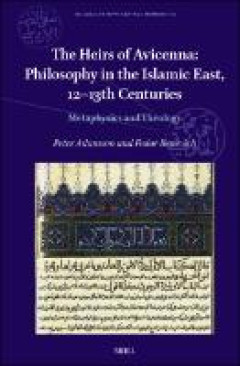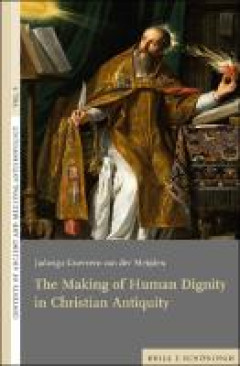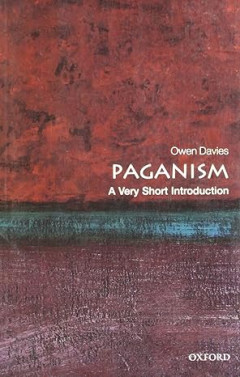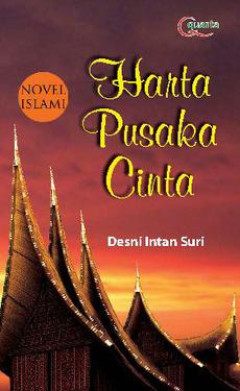Ditapis dengan
E-book Spiritual Contestations – The Violence of Peace in South Sudan
It was late morning in May 2014, and I was sitting on the sofa in the lobby of a Radisson Blu Hotel. The sliding doors of the hotel opened onto a typical, international hotel lobby with marbled floors, a series of lifts, a spiralling staircase and clusters of small, hard, colourful square-shaped sofas and arm-chairs. If you could only see the lobby, and not the street outside, you would not hav…
- Edisi
- -
- ISBN/ISSN
- 9781800106574
- Deskripsi Fisik
- 323 hlm
- Judul Seri
- -
- No. Panggil
- 299.675 PEN s

E-book The Heirs of Avicenna: Philosophy in the Islamic East, 12-13th Centuri…
This is the first in a series of sourcebooks charting the reception of Avicenna (Ibn S?n?, d.1037) in the Islamic East (from Syria to central Asia) in the 12th-13th centuries CE. Avicenna was the dominant philosophical authority in this period, who provoked generations of thinkers to subtle critique, defense, and development of his ideas. The series will translate and analyze hundreds of passag…
- Edisi
- -
- ISBN/ISSN
- 9789004503991
- Deskripsi Fisik
- 742 halaman, ilus.
- Judul Seri
- -
- No. Panggil
- 297.261 ADA t

E-book The God Argument: The Case against Religion and for Humanism
A powerful argument for humanism as an alternative to organized religion, by New York Times bestselling author A.C. Grayling, one of the world's leading public intellectuals. Examining all the arguments for and against religion and religious belief--across the range of reasons and motives that people have for being religious and how they stand up to scrutiny--The God Argument is a landmark b…
- Edisi
- -
- ISBN/ISSN
- 9781620401927
- Deskripsi Fisik
- 173 halaman, ilus.
- Judul Seri
- -
- No. Panggil
- 211.8 GRA t

E-book The Making of Human Dignity in Christian Antiquity
The book examines the late ancient history of one pivotal concept of contemporary culture, that of human dignity, with the view to identifying the moment in history when European culture worked out a systematic category for human axiological status. Whereas some studies concentrate on the notion of dignity in the Renaissance, suggesting that the earlier Christian thought emphasized human insign…
- Edisi
- -
- ISBN/ISSN
- 9783657796700
- Deskripsi Fisik
- 308 halaman, ilus.
- Judul Seri
- -
- No. Panggil
- 230.01 MEI t

E-book Muhammad and His Followers in Context: The Religious Map of Late Antiq…
This title is published in Open Access with the support of the University of Helsinki Library. The book surveys and analyzes changes in religious groups and identities in late antique Arabia, ca. 300-700 CE. It engages with contemporary and material evidence: for example, inscriptions, archaeological remains, Arabic poetry, the Qur??n, and the so-called Constitution of Medina. Also, it suggests…
- Edisi
- -
- ISBN/ISSN
- 9789004687134
- Deskripsi Fisik
- 390 halaman, ilus.
- Judul Seri
- -
- No. Panggil
- 297.6 LIN m
E-book A King and a Fool? : The Succession Narrative as a Satire
The question of genre has dominated scholarship focused on the narrative of King David in the Second Book of Samuel and the First Book of Kings. This nar-rative has variously been called, the Succession Narrative,1 the Court History,2 and the David Saga.3 In this book, A King and a Fool? The Succession Narrative as a Satire, I offer a new perspective on the genre of, what I will hereafter refer…
- Edisi
- -
- ISBN/ISSN
- 9789004411722
- Deskripsi Fisik
- 313 hlm
- Judul Seri
- -
- No. Panggil
- 221 MIL a
E-book Songs on the Road : Wandering Religious Poets in India, Tibet, and Japan
Wandering religious poets – that is to say, poets for whom wande-ring is a way of life and whose poetry deals with religious themes – can be found in a variety of ancient and modern cultures. In India, Tibet, and Japan the ascetic or saint who travels from place to place has been the subject of both veneration and fear for hund-reds, or even thousands, of years, as is evident i…
- Edisi
- -
- ISBN/ISSN
- 9789176351369
- Deskripsi Fisik
- 154 hlm
- Judul Seri
- -
- No. Panggil
- 294.3 EDH s

E-book Paganism: A Very Short Introduction
"Paganism" is an evocative word that even today conjures up deep-seated emotions and prejudices. Until recently, it was primarily a derogatory term used by Christians to describe the non-Christian cultures vanquished by their churches. For some it evokes images of sacrifice and barbaric behavior, while for others it symbolizes a peace-loving, nature-worshipping spiritual relationship with the e…
- Edisi
- -
- ISBN/ISSN
- 9780199235162
- Deskripsi Fisik
- 337 halaman, ilus.
- Judul Seri
- -
- No. Panggil
- 202 DAV p

E-Book Harta Pusaka Cinta
Chintiya Rubert diutus oleh ibunya, Friska Aisyaharni, untuk menemui neneknya di Ampek Angkek, Sumatera Barat. Misi Chintiya adalah meminta warisan yang menjadi hak ibunya. Friska sendiri tak mau menginjakkan kaki di kampung halamannya. Ia masih memendam dendam karena sikap ibunya yang keras dan selalu menghalang-halanginya, termasuk menentang keras keinginannya menikah dengan Hans Leonard Rube…
- Edisi
- Cet. 1
- ISBN/ISSN
- 9786020248592
- Deskripsi Fisik
- 347 hlm; 2 mb
- Judul Seri
- -
- No. Panggil
- 297.267 DES h
E-book The Practice of Texts : Education and Healing in South India
Prathik was a young ayurvedic physician, fresh out of college, and studying one of the Sanskrit medical classics, the A????gah?daya,at Mookkamangalam gurukula in India’s southwestern state of Kerala when he told me this.2 Prathik and I had spoken about his education over the course of several days, and he was always candid about the differences he saw betwee…
- Edisi
- -
- ISBN/ISSN
- 9780520383555
- Deskripsi Fisik
- 242 hlm
- Judul Seri
- -
- No. Panggil
- 294.5 CER t
 Karya Umum
Karya Umum  Filsafat
Filsafat  Agama
Agama  Ilmu-ilmu Sosial
Ilmu-ilmu Sosial  Bahasa
Bahasa  Ilmu-ilmu Murni
Ilmu-ilmu Murni  Ilmu-ilmu Terapan
Ilmu-ilmu Terapan  Kesenian, Hiburan, dan Olahraga
Kesenian, Hiburan, dan Olahraga  Kesusastraan
Kesusastraan  Geografi dan Sejarah
Geografi dan Sejarah